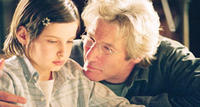 The third Juliette Binoche film at the festival (and alas, the last) is probably the weakest, though not for lack of sophisticated talents involved and a lot of deep thinking. Bee Season is a collaboration of directors Scott McGehee and David Siegel with a screenplay by Naomi Foner Gyllenhall. To celebrate, the entire Gyllenhall family was in attendance at my screening. I overheard Jake say to a publicist, “Mom is doing press on the carpet”. The screenplay is indeed worth celebrating. A complex adaptation of a book by Myra Goldberg, it tells the story of a Jewish family, and the obssessions that plague all its members. Only the Binoche character becomes revealed as clinically compulsive, but all the other characters demonstrate various degrees of obssessive need. Father Saul (yes, Richard Gere is playing a Jewish theologian. Uh- huh. That’s right) is obssessed with the possibility that his daughter’s proclivity for spelling bees is a sign that she has a mystic gift. Meanwhile, brother Aaron, played by Max Minghella, is being wooed into the Hare Krishna by Kate Bosworth. (Okay, an aside. You gotta love Hollywood. Only in that town could a young actress go from being the love interest of Kevin Spacey in Beyond the Sea, to the love interest of a fifteen year old in this movie, in the same year.)
The third Juliette Binoche film at the festival (and alas, the last) is probably the weakest, though not for lack of sophisticated talents involved and a lot of deep thinking. Bee Season is a collaboration of directors Scott McGehee and David Siegel with a screenplay by Naomi Foner Gyllenhall. To celebrate, the entire Gyllenhall family was in attendance at my screening. I overheard Jake say to a publicist, “Mom is doing press on the carpet”. The screenplay is indeed worth celebrating. A complex adaptation of a book by Myra Goldberg, it tells the story of a Jewish family, and the obssessions that plague all its members. Only the Binoche character becomes revealed as clinically compulsive, but all the other characters demonstrate various degrees of obssessive need. Father Saul (yes, Richard Gere is playing a Jewish theologian. Uh- huh. That’s right) is obssessed with the possibility that his daughter’s proclivity for spelling bees is a sign that she has a mystic gift. Meanwhile, brother Aaron, played by Max Minghella, is being wooed into the Hare Krishna by Kate Bosworth. (Okay, an aside. You gotta love Hollywood. Only in that town could a young actress go from being the love interest of Kevin Spacey in Beyond the Sea, to the love interest of a fifteen year old in this movie, in the same year.) Though very deeply considered and approached with love from all around, the film does not quite find the revelatory understanding that it promises. The fate of mother Miriam (Binoche)upstages everyone else’s tragedies and with even an understated performance here, there really is nothing else that seems worth feeling equally. Unfortunately, it is not the main storyline and the movie drifts to an unsatisfactory conclusion with the one that is.
 A happier experience, and one of the most serene of this festival, is Into Great Silence, a three hour documentary on monastic life by Philip Groening. Groening moved in with a community of Carthusian monks in the French Alps near Grenoble for six months and recorded, in exquisite detail, the transcendent simplicity of everyday life. The entirely static camera observes life, almost the way Haneke’s camera observed, but here the observation is not at all predatory. A monk sweeping his cell, a young novice bowing and kissing each of his new brothers at his commissioning, liturgies held in near darkness, the panoramic sky and snow over the monastary time lapsed for us over 24 hours in stars, clouds, sun and darkness, the red glow of night candlelight, all leave behind deep impressions. Even inanimate objects take on lasting significance, such as when the camera dwells on the rings of water in a holy water basin after the hands have dipped in it, or the towel used for wiping those hands hangs on, ruffled and wet. Reminiscent in style of last year’s Touch the Sound, by Thomas Riedelsheimer, this is documentary filmmaking at its most ethereal.
A happier experience, and one of the most serene of this festival, is Into Great Silence, a three hour documentary on monastic life by Philip Groening. Groening moved in with a community of Carthusian monks in the French Alps near Grenoble for six months and recorded, in exquisite detail, the transcendent simplicity of everyday life. The entirely static camera observes life, almost the way Haneke’s camera observed, but here the observation is not at all predatory. A monk sweeping his cell, a young novice bowing and kissing each of his new brothers at his commissioning, liturgies held in near darkness, the panoramic sky and snow over the monastary time lapsed for us over 24 hours in stars, clouds, sun and darkness, the red glow of night candlelight, all leave behind deep impressions. Even inanimate objects take on lasting significance, such as when the camera dwells on the rings of water in a holy water basin after the hands have dipped in it, or the towel used for wiping those hands hangs on, ruffled and wet. Reminiscent in style of last year’s Touch the Sound, by Thomas Riedelsheimer, this is documentary filmmaking at its most ethereal.
1 comment:
Bib -
you are going to be very disappointed in me as I did not see Everything is Illuminated - it became a casualty of scheduling. Sorry! But that's interesting about Bee Season - might have guessed.
Post a Comment